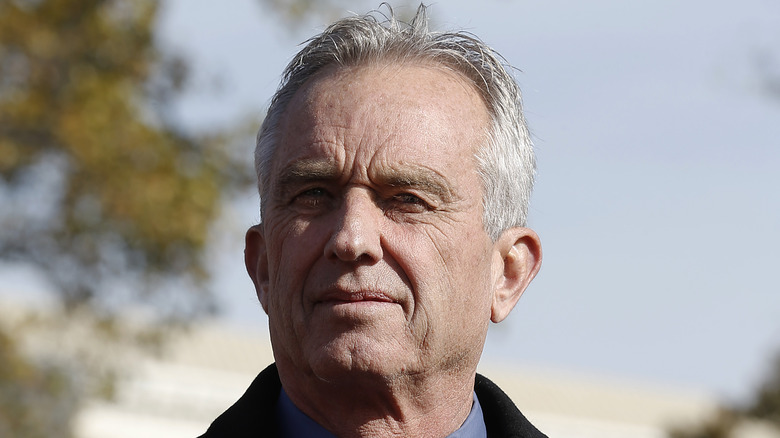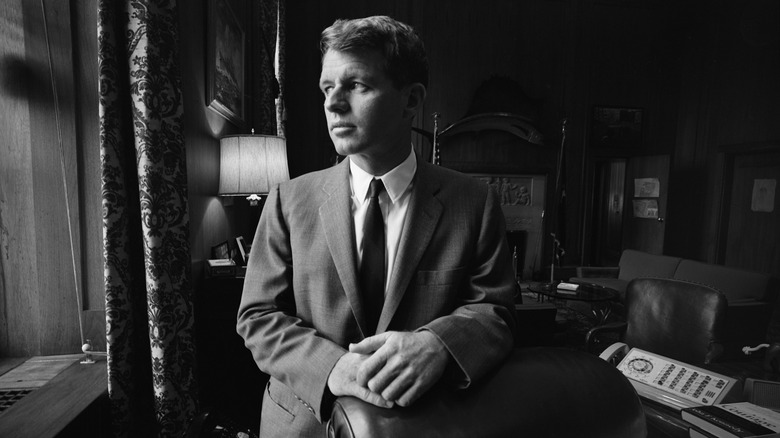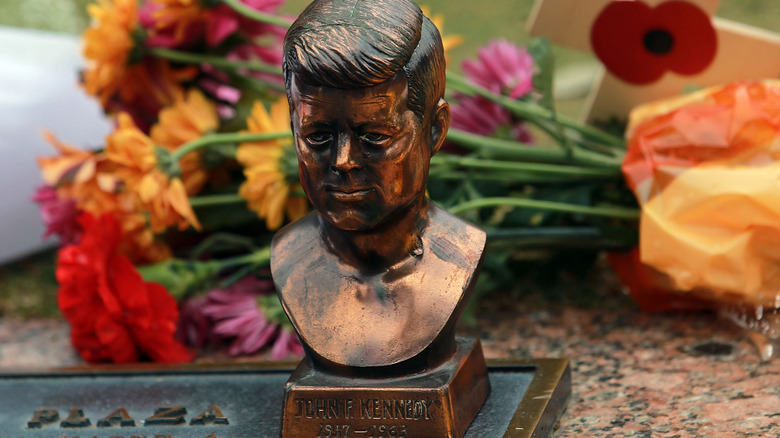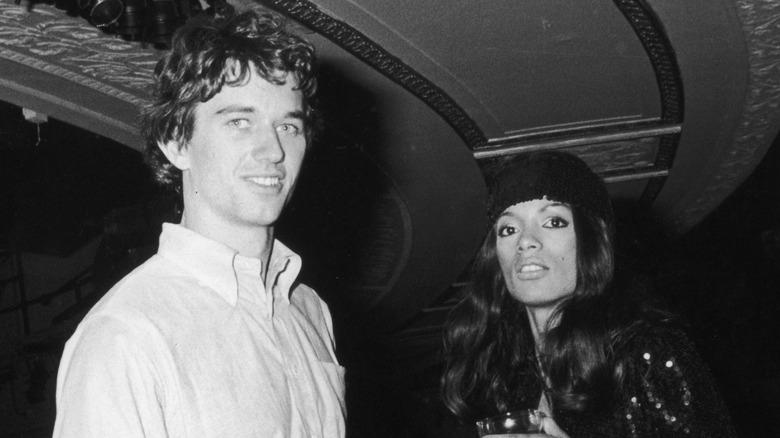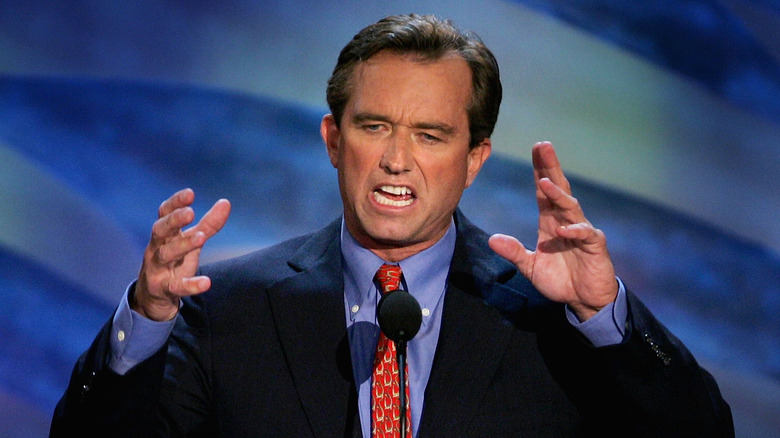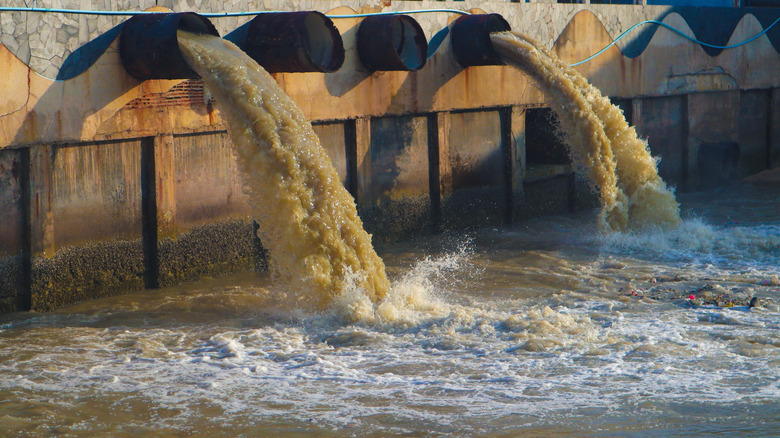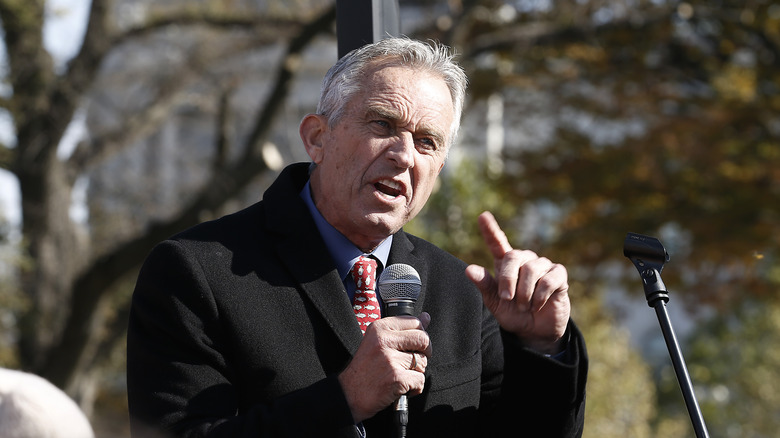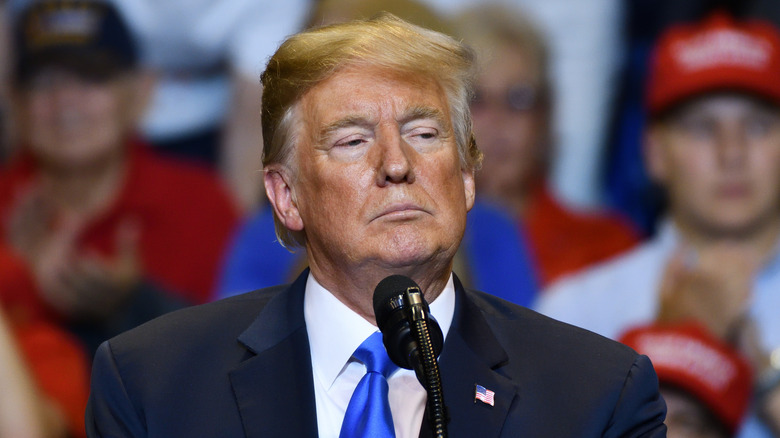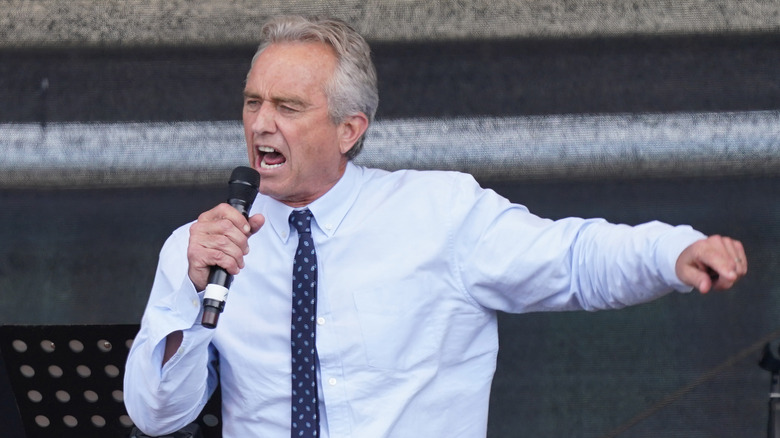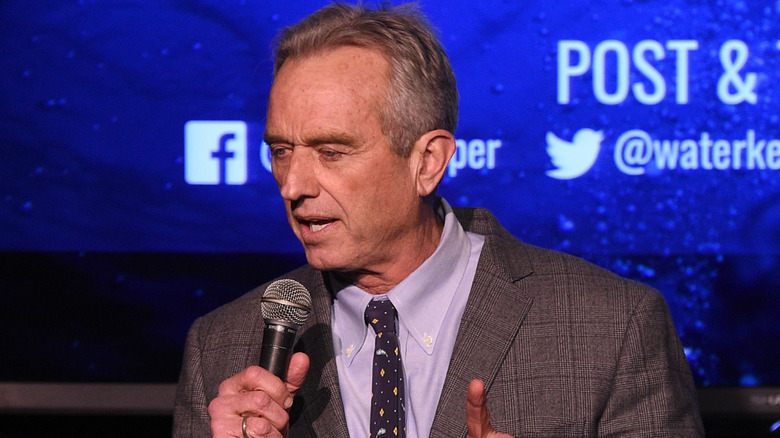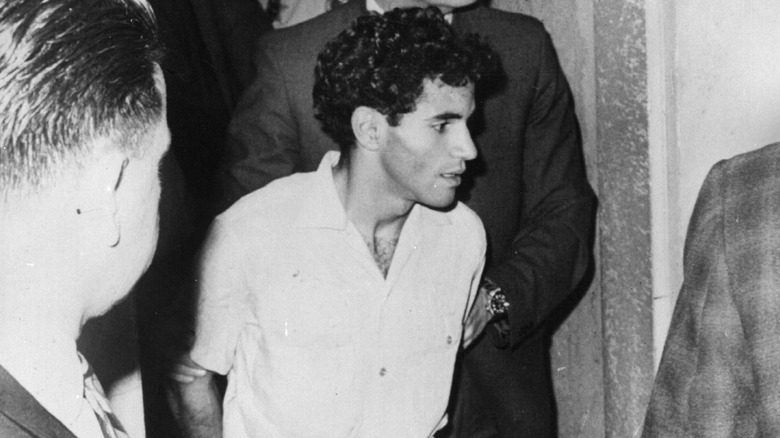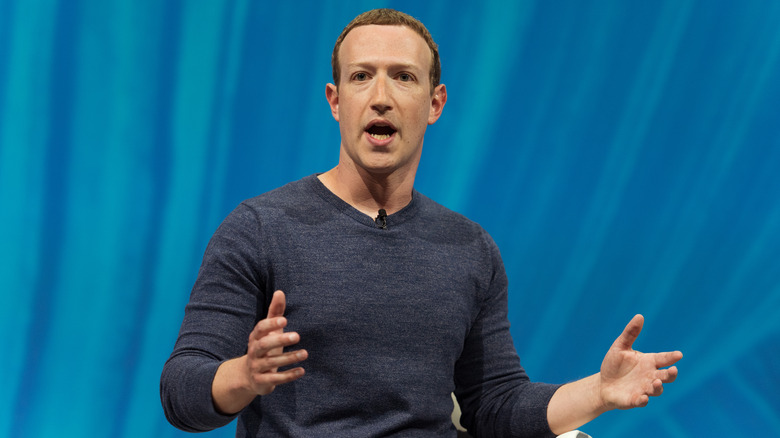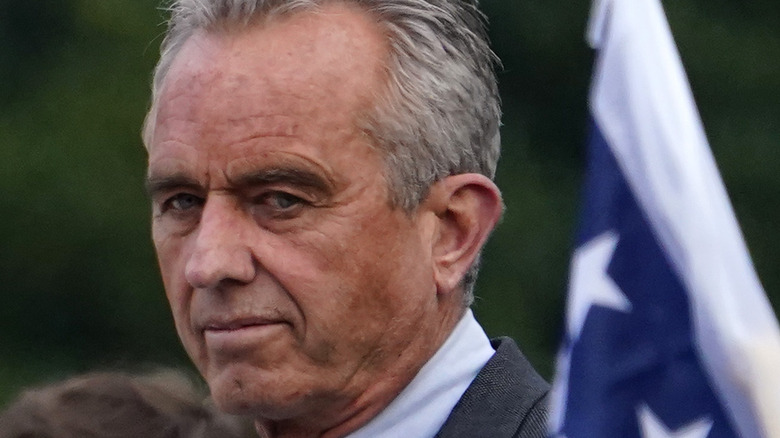Who Is Robert F. Kennedy Jr.? 12 Facts About JFK's Nephew
In American politics, there are very few (if any) names that carry more cachet than Kennedy. The family's involvement in government goes back well over a century — all the way back, in fact, to 1892, when John "Honey Fitz" Fitzgerald was elected to the Massachusetts legislature, per PBS. His daughter, Rose, and her husband, Joseph Kennedy, would produce three of the most prominent names in 20th century American politics in their sons John, Robert, and Ted, and various progeny of those men have been involved in government for decades.
No Kennedy has sought the presidency of the United States since Robert F. Kennedy, whose 1968 campaign ended with his tragic assassination in June of that year. That, however, may no longer be the case. In April 2023, his son, Robert F. Kennedy Jr., filed paperwork to mount his own presidential campaign in what could amount to a huge shakeup among those looking to challenge the incumbent chief executive, Joe Biden. The prospect of a Kennedy once again running for the highest office in the land is undoubtedly an intriguing one — but this particular Kennedy, for all his strengths, comes with some troubling baggage that could seriously hinder his bid. Here's what you should know about Robert F. Kennedy Jr.
Robert F. Kennedy Jr. has a sterling political pedigree
If one were to put together a short list of qualifications for president of the United States, putting down "son of Robert F. Kennedy" and "nephew of John F. Kennedy" as your first two items would be a pretty decent start. Like his father (pictured above), who served as attorney general in his uncle's administration, Robert F. Kennedy Jr. has made a respectable career for himself as an attorney; he has studied at Harvard and the University of Virginia (where his dear old dad got his law degree), and he received his master's degree in environmental law from Pace University, which has partnered to offer business courses with the John F. Kennedy Catholic Preparatory School.
Kennedy Jr. has put that degree to good use throughout his legal career, but until recently, he has never shown much in the way of political ambition. Of course, his father and uncles are at least as well-known for tragedy and scandal as they are for their political accomplishments, which might have served as a bit of a deterrent.
His early life was fraught with tragedy
On November 22, 1963, the presidency and life of John F. Kennedy were cut tragically short by the bullet of an assassin, Lee Harvey Oswald, in Dallas, Texas. The violent, public nature of his uncle's death would certainly have made an impression on Robert F. Kennedy Jr., who was only 9 years old at the time — but even that must have paled in comparison to the tragedy that would befall his immediate family just five years later.
In the middle of his own presidential campaign in 1968, then-Senator Robert F. Kennedy was gunned down by assassin Sirhan Sirhan at the Ambassador Hotel in Los Angeles, just moments after announcing to a crowd of cheering supporters that he had won the California presidential primary. Only 14 at the time, Kennedy Jr. served as a pallbearer at his father's funeral. Two years later, at a Mass marking the second anniversary of the assassination, Kennedy Jr. read a few choice excerpts from his father's speeches. As reported by The New York Times, this included a favorite quotation of Kennedy's, a plaintive plea for optimism: "Some men see things as they are and ask why they are so; let us dream of what could be and ask, 'Why not?'"
His legal career was almost derailed by a drug bust
As a young man in the early '80s, Robert F. Kennedy Jr. was poised to follow in his father's footsteps by making a name for himself as a lawyer. But shortly after passing the New York State Bar Exam in 1983, there came a slight hiccup. In September of that year, The New York Times reported that, according to a family friend, Kennedy Jr. was en route to South Dakota to seek treatment for drug dependency when that issue caught up to him. He reportedly became ill in the restroom of an airplane in Rapid City, and when his flight bag was searched by authorities, they turned up heroin — a small amount, but any amount at that time was enough for a felony charge in that state.
In June 1985, The New York Times reported that Kennedy Jr. had been sentenced to two years of probation, but that he had satisfied the conditions after only a year. He was admitted to the New York State bar that year, free to practice law — and as it happened, the course of his respectable law career might have been slightly different if not for the year he spent on probation.
If you or anyone you know needs help with addiction issues, help is available. Visit the Substance Abuse and Mental Health Services Administration website or contact SAMHSA's National Helpline at 1-800-662-HELP (4357).
His dedication to environmental issues was solidified by community service
Obviously, one doesn't pursue a high-level college degree in environmental law without having a passion for the environment, but it was during Robert F. Kennedy Jr.'s stint on probation that his future as an advocate for the environment appeared to solidify. As a condition of his probation following his 1983 drug arrest, he was required to perform 1,500 hours of community service (via The New York Times), and those hours were spent as a full-time volunteer for the Natural Resources Defense Council, a nonprofit environmental advocacy group that was founded in 1970.
According to its website, the NRDC was among the first organizations of its type to focus on litigation on behalf of the environment, which likely made its philosophies a pretty good match for Kennedy Jr. During this same time, in 1984, he began an association with Riverkeeper, a New York-based clean water organization that would employ his services as an attorney — and, later, a board member — for over three decades. Kennedy Jr. would eventually help expand Riverkeeper into a worldwide alliance of organizations, Waterkeeper, which he co-founded in 1999.
He has scored important victories against corporations on behalf of the environment
According to Stroud Water Research Center, Riverkeeper — with Robert F. Kennedy Jr. as lead prosecuting attorney — spent much of the '80s and '90s patrolling the Hudson River, one of the most notoriously polluted waterways in the U.S., in search of prosecutable violations. By diligently prosecuting polluters one at a time, the organization was able to transform the river and set a model for other communities to do the same.
Kennedy Jr. has also taken on some truly intimidating corporations in court, as noted by Vanity Fair. He helped to put the kibosh on Con Edison's plan to build a power plant that would have decimated New York's Storm King Mountain (via The New York Times); he's also helped to thwart plans by General Electric to develop wetlands that served as important spawning grounds for local fish species, to name just a couple of examples. Biography reports that he even joined the 2016 gathering at the Standing Rock Sioux Reservation in protest of the proposed Dakota Access Pipeline, at which he addressed the crowd. "Across the nation, communities of color face environmental and public health threats most communities don't have to think about," he said. "This historic peaceful protest declares that all communities deserve clean water."
Certainly, that right has been a preoccupation throughout Kennedy Jr.'s career — but within the last couple decades, he has developed a new focus, one which is puzzling and more than a little misguided.
Robert F. Kennedy Jr. has been publicly against vaccines for years
In 2005, Robert F. Kennedy Jr. penned an article that was simultaneously published by Rolling Stone and by Salon on its website, titled "Deadly Immunity." In this article, he claimed to have been "reluctantly" drawn into the debate about the thoroughly, consistently debunked "link" between vaccines and autism. He ended up a convert, however, and the piece — which both outlets eventually withdrew after further fact-checking — used half-truths, distorted and out-of-context quotes, and outright fabrications to claim a sinister conspiracy to pump up the profits of pharmaceutical companies by covering up the (again, completely discredited) dangers of vaccines (via Scientific American).
Unfortunately, even after the outlets that initially published the article issued corrections, Kennedy Jr. continued to double down on the falsehoods, such as the claim that thimerosal — a preservative that, while generally safe, has not been widely used in vaccines since 2001 — was present in many vaccines being given to children at the time. The fact that there exists a consensus in the scientific community that vaccines are safe and effective has not changed Kennedy Jr.'s stance in recent years — if anything, he appears to have become even more entrenched in his thinking on the issue.
He almost joined the Trump administration
In 2017, Robert F. Kennedy Jr. met with a powerful individual who happened to share his controversial views on vaccines: Donald Trump, who has espoused support for numerous conspiracy theories. Trump, too, has long given credence to misinformation about vaccines and autism — both before and during his candidacy and eventual election to the presidency. According to The Washington Post, the purpose of his meeting with Kennedy Jr. was to discuss the possible establishment of a "commission on vaccine safety" with Kennedy Jr. as its chairman.
After the discussion (which took place in early January 2017, when Trump was still president-elect), Kennedy Jr. inexplicably characterized himself (and Trump) as "pro-vaccine," but said the pair had "doubts" and "questions" about the U.S. government's vaccine policy. Trump's then-spokeswoman Hope Hicks told the press corps that Trump had enjoyed meeting with Kennedy Jr. to discuss "a range of issues," saying that "The president-elect is exploring the possibility of forming a commission on autism, which affects so many families; however no decisions have been made at this time." Fortunately, no decision ever was made on that possibility, as the commission never came to fruition.
He became an anti-Covid vaccine crusader during the pandemic
In early 2019, one might have thought the onset of a worldwide novel coronavirus pandemic might have forced a rethinking of beliefs on the part of the anti-vaccine crowd — but this, of course, could not have been further from the truth. Even as researchers frantically strived to adapt mRNA vaccine technology to fight the virus that became known as COVID-19, that crowd steadily began to ramp up its rhetoric, and Robert F. Kennedy Jr. was not an exception.
In January 2022, after Kennedy Jr. took part in a raucous rally against vaccine mandates in Washington, D.C., The New York Times spoke with several of his friends and family members who were mortified by his continued insistence on spreading misinformation with regard to vaccines, including his sister Kerry Kennedy, brother Christopher Kennedy, and longtime friend Blake Fleetwood, who opined that Kennedy Jr. was jeopardizing his legacy of activism by sticking to his guns on the issue, and wondered, "Why is he blowing his whole life's work?"
It wasn't the first time Kennedy Jr.'s family has had occasion to dispute his stance on vaccines. In May 2019, which of course was before the pandemic, three relatives — Kathleen Kennedy Townsend, Joseph P. Kennedy II, and Maeve Kennedy McKean — co-authored an article for Politico in which they stated, "We stand behind him in his ongoing fight to protect our environment. However, on vaccines he is wrong. And his and others' work against vaccines is having heartbreaking consequences."
He has used incendiary language in his fight against vaccines
Robert F. Kennedy Jr. often takes a measured tone when discussing his anti-vaccination stance with major media outlets — but when he is preaching to the choir, so to speak, he has demonstrated a willingness to use rhetoric that is anything but measured. Take, for example, the Washington, D.C., rally of January 2022, during which he suggested that Jewish people in Germany during the Holocaust had it better than anti-vaxxers in America during the pandemic, and even invoked the name of Anne Frank in making his (frankly delusional) point, according to Vanity Fair. After being slammed by the likes of the Auschwitz Memorial (which cited his remarks as a "sad symptom of moral [and] intellectual decay,") he issued an apology — but this was not the first time he'd used such an analogy.
In 2015, at a screening of an anti-vax documentary on which he was a producer, he remarked to the crowd, "[Children] get the shot, that night they have a fever of 103 [degrees], they go to sleep, and three months later their brain is gone. This is a Holocaust, what this is doing to our country" (via The Guardian). In that case, he also offered an apology — not for the wild inaccuracy of this statement, but for his choice of words.
He has also pushed other baseless conspiracy theories
It should come as no surprise that when one clings to an outlandish, authoritatively debunked conspiracy theory, it is probably not the only one being clung to. Indeed, at that same Washington, D.C., rally where he compared anti-vaxxers to Holocaust victims in January 2022, Robert F. Kennedy Jr. took several unfortunate detours into Conspiracytown. He asserted that vaccine passports (which never became a thing) would be implemented in order to force "obedience to arbitrary government dictates" and "make you a slave." He also trotted out the head-scratching paranoia around 5G wireless networks, saying, "They're putting in 5G to harvest our data and control our behavior," before moving on to fears about "digital currency that will allow them to punish us from a distance and cut off our food supply" (via The Weston A. Price Foundation).
He has also joined the chorus of those who subscribe to the conspiracy theories around the assassination of John F. Kennedy, saying in 2013, "The evidence at this point I think is very, very convincing that it was not a lone gunman" (via CBS News). Even more unbelievably, in 2018, he visited his father's murderer, Sirhan Sirhan, in prison — and even though Sirhan has admitted to shooting Robert F. Kennedy, his son is not so sure. "I went there because I was curious and disturbed by what I had seen in the evidence," Kennedy Jr. told The Washington Post after his visit. "I was disturbed that the wrong person might have been convicted of killing my father."
He's been kicked off various social media platforms, and sued them for 'censorship'
As anybody who lived through it will attest, the COVID-19 pandemic was a time during which disinformation was flying fast and furious, and whether the one spreading it was some anonymous dude on Twitter or then-President Donald Trump, the result was the same. Confusion over the origins of the virus, the means by which it spread, the efficacy of mitigating measures such as masking and hand sanitizing, and the safety of vaccines surely contributed to COVID's jaw-dropping death toll, which as of this writing stands at over 1.1 million people in the U.S. alone, according to the World Health Organization.
Social media outlets in particular were key to the spreading of bad info about the virus, and it didn't take long for pretty much all of them to implement policies against the dissemination of lies and conspiracy theories on their platforms. As a result of those efforts, between September 2021 and August 2022, accounts belonging to Robert F. Kennedy Jr. or his nonprofit, Children's Health Defense, were booted from YouTube, Facebook, and Instagram. Forbes reports that in January 2023, Kennedy Jr. led a band of anti-vax activists in filing a lawsuit against the Trusted News Initiative, which was formed by the BBC and includes media outlets from all over the world. The purpose of the initiative is to work with social media companies to combat misinformation — but the lawsuit alleges that this amounts to censorship and discrimination against their views.
He's running for president as a Democrat
Robert F. Kennedy Jr.'s family is probably the most prominent in the history of the American Democratic Party. In light of his staunch anti-vaccine stance, his embracing of conspiracy theories of multiple stripes, and his brief flirtation with the Trump administration, one could be forgiven for thinking that he had broken ranks with his family to join the Republican Party — but one would be wrong. According to the paperwork filed by Kennedy Jr. in April 2023, he intends to run for president as a Democrat — which means he wouldn't be taking on Joe Biden in the general election, but in the Democratic primary.
As of this writing, the 2024 presidential election has not yet come into focus. While Donald Trump has announced his intention to run for a third time, he is also under indictment for alleged financial crimes related to his 2016 campaign, and faces a host of other legal problems. Biden, who is 80 years old, has not yet announced his intention to run — but he is expected to, and while his record on dealing with the pandemic, creating jobs, and corralling runaway inflation has been applauded by supporters, he has suffered from middling-to-low approval ratings for his entire presidency. As a Democratic candidate with several controversial positions that are quite in line with Republicans' stances, Kennedy Jr. could throw a wrench into the 2024 plans of both parties — and with his unconventional politics and iconic name, the idea that he could be sitting in the Oval Office in January 2025 is not outside the realm of possibility.
